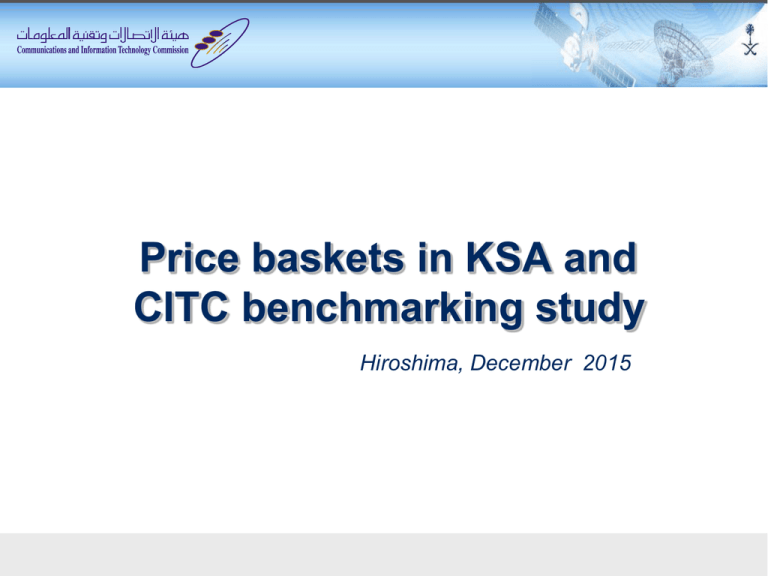Price baskets in KSA and CITC benchmarking study Hiroshima, December 2015
advertisement

Price baskets in KSA and CITC benchmarking study Hiroshima, December 2015 What is a price basket? • A (monthly) consumption volume, representative of the average consumer of telecoms services. • Typically calculated for voice calls (number, minutes), SMS and data volume Methodology CITC followed in defining the KSA price baskets Step 1 Usage baskets calculated based on data provided Step 2 Cross-check and finalisation of the usage baskets • Data provided by service providers in response to data requests • Average consumption/user/month based on data received • Evaluation of the advertised tariff plans by the service providers • Assessment of the consumption data in Step 1 vs. tariff plans 1 1 CITC carried out a benchmarking study in early 2015 using price baskets and based on principles of the ITU approach Objectives of the study • Estimate the cost of telecoms services for an average user in KSA • Compare the estimated cost against benchmark countries (in the region and the rest of the world) Covering mobile and fixed markets Benchmarking KSA against 23 countries Use of price baskets Using advertised tariff plans of service providers during Q1 2015 2 2 KSA-specific consumption baskets Mobile voice and SMS services 160 calls Mobile broadband services Consumption patterns in KSA are significantly different than ITU average 2 GB 100 SMS 30 calls ITU 40 SMS KSA Average 0,5 GB ITU KSA Average Given the differences observed, comparing the cost of the KSA consumption baskets across countries was the logical approach for our study 3 3 Bundle tariffs Bundled mobile services 2 GB 160 calls Discounts for bundled purchase* 29% 27% 25% 21% 20% 20% 100 SMS 14% 12% 11% 6% 0,5 GB 30 calls ITU 40 SMS KSA Average Most current plans in KSA are bundles combining 3 services Especially in mobile, bundles are becoming more attractive and demanded Given the significant discounts with bundles, we considered the cost of the KSA consumption baskets when purchased as a bundle (as well as individually) (*) % difference of the lowest cost of purchasing mobile voice, SMS and data as a bundle vs. İndividually observed in benchmark countries 4 4 Multiple usage profiles 640 calls ITU KSA We have observed that there are multiple consumption profiles in the KSA 160 calls 100 SMS ITU 20 SMS 0,5 GB KSA Low Inclined towards individual services 2 GB 160 SMS 80 calls 0,5 GB 30 calls 4 GB 40 SMS KSA Average KSA High Inclined towards bundled services We have benchmarked the cost of services for each usage profile to get the full picture of the price levels for different consumer groups 5 5 Wide set of data used ITU CITC Analysed service providers 1 2 All current plans (incl. bundles) X Only prepaid or only postpaid for some service sets Prepaid and postpaid Type of plan Important findings Most economic tariffs are not always available from the first operator In 14/24 countries, lowest costing tariff was from 2nd operator for mobile bundles Consideration of all plans ensure bundle discounts are captured 50% of the time the lowest costing tariff was a bundle (for mobile service sets) Analysis of both prepaid and postpaid plans better fits with market realities For mobile voice and SMS services, in half of the countries, the lowest costing tariff was a postpaid plan 6 6 Approach to comparison of local prices ... Method 1 (Nominal) Convert using average 12-month FX rate Prices in local currency Method 2 (Affordability) Convert using average 12-month USD FX rate / GNI per capita Method 3 (PPP) Adjust using PPP factors SAR % of the monthly GNI p.c. We have followed the conversion principles adopted by the ITU for converting local prices, however.... SAR PPP 7 7 ... Approach to comparison of local prices Price level index (PLI) for different consumption categories* 140 .. we have also observed that purchasing power of 1 SAR is closer to benchmark average in the ‘communication’ category than other categories 120 PLI 100 80 60 40 20 0 GDP Housing, and utilities KSA GCC Communication Benchmark avg Under Method 3 we have used the PPP factors calculated by the World Bank for the communication category. * Source: World Bank 8 8 Suggestion #1: Given pace of change in usage habits, baskets in MIS Reports may need frequent review to adequately reflect the market trends Mobile usage profile used in previous ITU MIS reports ? 100 SMS 100 SMS 0,5 GB 30 calls 0,5 GB 30 calls 100 SMS 100 SMS ITU profile ITU profile 2009 2010 0,5 GB 30 calls ITU profile 2011 100 SMS 0,5 GB 30 calls ITU profile 2012 30 calls 0,5 GB ITU profile 2013 2014 Updated usage baskets will improve representativeness of the consumers 9 9 Suggestion #2: In addition to a world average, a low and a high consumption basket may lead to deeper understanding of the markets ? World high consumption 100 SMS 30 calls World average consumption 0,5 GB New ITU profile ? World low consumption Better comparability among countries with similar consumption profiles 10 10 Other Suggestions Data from 2 service providers Consideration of all announced tariffs from 2 providers definitely improve the accuracy of the study Improved accuracy of results Wider set of tariff plans Consideration of all tariff plans (including bundles and all prepaid and postpaid plans) in countries would better capture the overall price levels given the changing consumption habits Better fit with market realities Communication PPP factors Usage of the PPP factor for communication category eliminates the effect of asymmetric price differences in non-telecoms sectors across countries Improved accuracy with PPP comparison 11 11 Thank you 12 12

